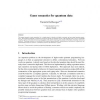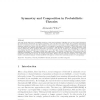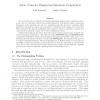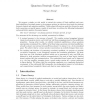139
click to vote
ENTCS
2011
14 years 8 months ago
2011
This paper presents a game semantics for a simply-typed λ-calculus with qbits constants and associated quantum operations. The resulting language is expressive enough to encode a...
135
click to vote
TOC
2010
14 years 8 months ago
2010
: We define quantum expanders in a natural way and give two constructions of quantum expanders, both based on classical expander constructions. The first construction is algebraic,...
120
click to vote
ENTCS
2011
14 years 9 months ago
2011
The past decade has seen a remarkable resurgence of the old programme of finding more or less a priori axioms for the mathematical framework of quantum mechanics. The new impetus...
141
click to vote
CORR
2011
Springer
14 years 9 months ago
2011
Springer
Abstract. Notoriously, quantum computation shatters complexity theory, but is innocuous to computability theory [17]. Yet several works have shown how quantum theory as it stands c...
117
click to vote
CORR
2011
Springer
14 years 9 months ago
2011
Springer
We study the power of classical and quantum algorithms equipped with nonuniform advice, in the form of a coin whose bias encodes useful information. This question takes on particu...
151
click to vote
CORR
2010
Springer
14 years 11 months ago
2010
Springer
We propose a simple yet rich model to extend the notions of Nash equilibria and correlated equilibria of strategic games to the quantum setting, in which we then study the relatio...
140
click to vote
ICMLA
2010
15 years 23 hour ago
2010
Quantum systems are promising candidates of future computing and information processing devices. In a large system, information about the quantum states and processes may be incomp...
129
click to vote
COLT
2010
Springer
15 years 2 days ago
2010
Springer
We define a new model of quantum learning that we call Predictive Quantum (PQ). This is a quantum analogue of PAC, where during the testing phase the student is only required to a...
101
click to vote
TC
2010
15 years 13 days ago
2010
—In this paper, we present a quantum multicasting network, called a generalized quantum connector (n-GQC), which can be used to multicast quantum information from n inputs to n o...
153
click to vote
PPL
2010
15 years 14 days ago
2010
It has been said that quantum cryptography in general o ers a secure solution to the problem of key enhancement. This means that two parties who already share a small secret key, ...




